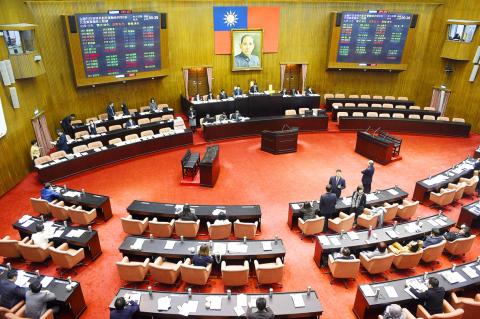Lawmakers yesterday passed the Act on Financial Technology Innovations and Experiments (金融科技創新實驗條例) in a bid to upgrade the nation’s financial sector by granting technology firms more leeway when experimenting with innovative financial services.
The act was inspired by a sandbox proposed by the UK Financial Conduct Authority for field-testing financial services by tech firms.
Firms that have passed an assessment to use the sandbox would be allowed to bypass — in part or in full — certain regulations after gaining the approval of the Financial Supervisory Commission (FSC), the act stipulates.

Photo: Chen Chih-chu, Taipei Times
The FSC is to consult responsible agencies when it wants a test financial service to be exempted from certain rules, with the exception of the Money Laundering Control Act (洗錢防制法) and the Act Against the Threats of Hacking (資恐防治法), which cannot be exempted, it says.
In addition, a review committee is to be established under the FSC to review plans.
To promote innovation, the committee is required to hire experts from the private sector for between one-third and half of its staff, with the rest composed of representatives from government agencies, the act states.
To avoid profitability being harmed by red tape, the committee is to decide within 60 days of a submission whether it qualifies for the sandbox. Approved plans would then be given an 18-month time frame within which firms would be allowed to launch trial runs of their services.
The 18-month period may be extended to no more than 36 months at the discretion of the FSC.
The review committee is to submit a report to the Legislative Yuan detailing the results of a project and which regulations should be changed within 90 days of the end of a trial, so that a new service may be put on the financial market after necessary legal amendments are approved.
People who experience financial losses as a result of their participation in a financial service test are protected by the Financial Consumer Protection Act (金融消費者保護法) and should file complaints with the Financial Ombudsman Institution.
Democratic Progressive Party Legislator Karen Yu (余宛如), who initiated the bill, said that the passage of the act makes Taiwan the first nation in the world to introduce a financial regulatory sandbox law.
The act would greatly increase the flexibility of financial-oriented regulations that have been limiting innovation, Yu said, adding that it would also break down barriers between sectors, so that tech and financial firms can work together seamlessly.
The sandbox model can also be applied to a variety of fields, such as the research and development of drones, she added.
Chinese Nationalist Party (KMT) Legislator Jason Hsu (許毓仁) said the three-year trial period offered by the sandbox is the longest in the world and lauded the act as “ushering in a new era for Taiwan’s financial technology.”
He said the legislation came later than some would have hoped, as the nation’s achievements in innovative financial services have trailed behind several others in the region such as Hong Kong and South Korea, but the passage of the act was “better late than never.”

Taiwanese can file complaints with the Tourism Administration to report travel agencies if their activities caused termination of a person’s citizenship, Mainland Affairs Council Minister Chiu Chui-cheng (邱垂正) said yesterday, after a podcaster highlighted a case in which a person’s citizenship was canceled for receiving a single-use Chinese passport to enter Russia. The council is aware of incidents in which people who signed up through Chinese travel agencies for tours of Russia were told they could obtain Russian visas and fast-track border clearance, Chiu told reporters on the sidelines of an event in Taipei. However, the travel agencies actually applied

New measures aimed at making Taiwan more attractive to foreign professionals came into effect this month, the National Development Council said yesterday. Among the changes, international students at Taiwanese universities would be able to work in Taiwan without a work permit in the two years after they graduate, explainer materials provided by the council said. In addition, foreign nationals who graduated from one of the world’s top 200 universities within the past five years can also apply for a two-year open work permit. Previously, those graduates would have needed to apply for a work permit using point-based criteria or have a Taiwanese company

The Shilin District Prosecutors’ Office yesterday indicted two Taiwanese and issued a wanted notice for Pete Liu (劉作虎), founder of Shenzhen-based smartphone manufacturer OnePlus Technology Co (萬普拉斯科技), for allegedly contravening the Act Governing Relations Between the People of the Taiwan Area and the Mainland Area (臺灣地區與大陸地區人民關係條例) by poaching 70 engineers in Taiwan. Liu allegedly traveled to Taiwan at the end of 2014 and met with a Taiwanese man surnamed Lin (林) to discuss establishing a mobile software research and development (R&D) team in Taiwan, prosecutors said. Without approval from the government, Lin, following Liu’s instructions, recruited more than 70 software

Chinese spouse and influencer Guan Guan’s (關關) residency permit has been revoked for repeatedly posting pro-China videos that threaten national security, the National Immigration Agency confirmed today. Guan Guan has said many controversial statements in her videos posted to Douyin (抖音), including “the red flag will soon be painted all over Taiwan” and “Taiwan is an inseparable part of China,” and expressing hope for expedited reunification. The agency last year received multiple reports alleging that Guan Guan had advocated for armed reunification. After verifying the reports, the agency last month issued a notice requiring her to appear and explain her actions. Guan